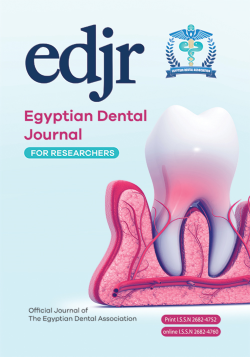Dina Ahmed AbdEllatif , Lamiaa Sayed Kheirallah And Maha Ahmed Taymour,
ABSTRACT
Conservation Of The Tooth Substance Connected With Aesthetic Treatment Modalities For Teeth Led To Rise In The Placement Of Indirect Restorations; Inlay, Onlay, Endo-crown, Veneer, Partial Coverage And Full Coverage Restorations In The Recent Years. The Aim Of This Study Was To Evaluate The Shear Bond Strength Of Vita Enamic Discs Bonded To Enamel And Dentin Using Bifix QM Resin Cement Versus Rely X Ultimate Resin Cement.
Materials and Methods: Twenty Eight Human Premolar Teeth Were Selected Then Divided Into Two Main Groups According To The Cement Used Then Further Subdivided Into Two Subgroups According To The Dental Substrate Either Enamel Or Dentin (n=7). Ceramic Discs Of 2mm Height And 4mm Diameter Were Cemented By Relay X Ultimate As A Control And Bifix QM As An Intervention. All Specimens Were Stored In Distilled Water For 24hr At 37?. The Specimens Were Loaded Until Fracture In A Shear Test At A Crosshead Speed Of 0.5mm/min In A Universal Testing Machine After Thermocycling.
Results: Relay X Cement Showed Significant Higher Shear Bond Strength In Enamel Substrate. Bifix QM Cement Showed Non Significant Higher Bond Strength In Dentin Substrate.
Conclusions: Rely X Ultimate Becomes The Cement Of Choice In The Cementation Of Conservative Restoration As Veneers. Both Cements Can Be Used For Bonding Vita Enamic Restorations With More Preferences To Bifix QM Cement When Most Of The Preparation In Dentin.


